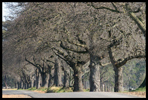During World War I, the radical left wing Melbourne newspaper the Labor Call was one of the few Australian newspapers which openly opposed the war and condemned Australian participation in it. Despite the rigours of wartime censorship, during the course of the war, the Labor Call still managed to publish a number of poems which expressed strong anti-war sentiments.
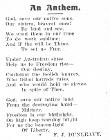

.
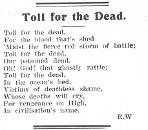

.
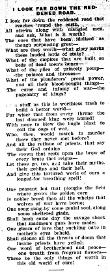

.
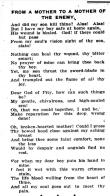

.


.
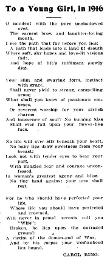

.
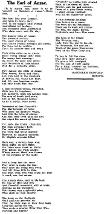

A poem which reflects on the human cost of the failed Gallipoli campaign. The poem is deeply critical of Winston Churchill, one of the principal architects of the campaign.
'These Too Were Men', T.W. Mercer, the Labor Call, 13 May, 1915
This poem by the English author T.W. Mercer appeared in the Labor Call in early May 1915, at about the time the initial reports of the landing at Gallipoli began appearing in the Australian newspapers. With the accompanying illustration adding to its impact, this was perhaps one of the most powerful anti-war poems to appear in the Australian press during World War I.
During World War I, very few Australian writers questioned the morality of the war or sought to examine the broader political and social dynamics which made the war possible. Victorian Labor figure and poet J.K. McDougall was an exception.
Throughout the war years, McDougall’s anti-war poems appeared at intervals in the radical left wing Melbourne newspaper the Labor Call. Given the dictates of wartime censorship, McDougall was rarely able to speak out against the war itself. However, he was able to publish poems which condemned war in general – which in effect amounted to a condemnation of World War I by inference. The fact that McDougall’s anti-war poems were published at all is in itself quite remarkable, although at least one of his poems is known to have been altered at the insistence of the censor.
As might be expected, McDougall's anti-war stance sparked a good deal of animosity. During the 1915 and 1917 federal election campaigns, McDougall's political opponents maintained that he was unfit for election to public office. During both the 1915 and 1917 election campaigns, in order to discredit him, McDougall's opponents circulated an extract from his Boer War era poem, 'The White Man's Burden', which they claimed insulted Diggers. In 1919, a group of recently returned ex-servicemen were so outraged by 'The White Man's Burden', that they drove up to McDougall's home at Maroona, in Western Victoria, and abducted and then tarred and feathered him.
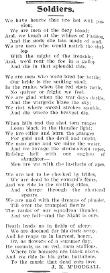

Another of McDougall's poems which condemns war, without specifically mentioning World War I.
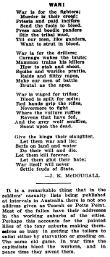

Here McDougall considers the brutality and mindless violence of war. Although the poem does not specifically mention World War I, it clearly alludes to and was intended as a critique of the war.
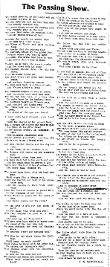

.
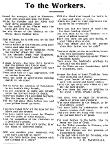

.
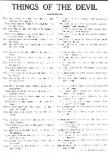

This poem attracted the attention of the censor, who objected to McDougall's original line 'Yet to kill for a king is to kill for the devil' (stanza 5). For the poem to pass for publication, the Labor Call editor was obliged to substitute the word 'kaiser' for 'king', which significantly alters the nuance of meaning and tames the work's anti-war sentiment.


This poem was originally written at the time of the Boer War as a scathing condemnation of capitalism, imperialism and war. It resurfaced during World War I, at the time of the 1915 and 1917 federal elections, when McDougall's political opponents tried to use an extract from the poem to discredit him.
You might be interested in...



